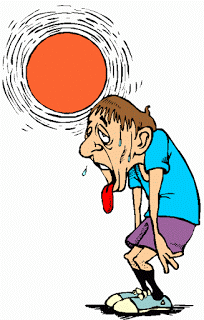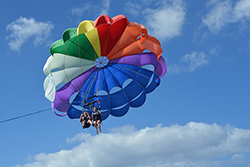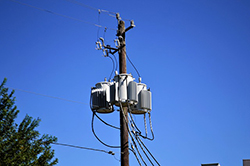10 months ago
·
by
Erin Carlson ·
0 comments
 Higher summer temps mean fun in the sun on weekends, but those scorching temperatures can be deadly for people who aren’t prepared for them. Heat exhaustion affects a wide variety of folks, and unfortunately, most aren’t prepared to handle it. Once the temps start to rise, one must be proactive to protect oneself from succumbing to heat exhaustion and know how to respond.
Higher summer temps mean fun in the sun on weekends, but those scorching temperatures can be deadly for people who aren’t prepared for them. Heat exhaustion affects a wide variety of folks, and unfortunately, most aren’t prepared to handle it. Once the temps start to rise, one must be proactive to protect oneself from succumbing to heat exhaustion and know how to respond.
Who Is Susceptible?
Those most at risk are workers whose job requires them to be outdoors. These include construction workers, HVAC workers, roofers, landscapers and many others. However, there are other jobs, such as automobile sales people, that may seem like an indoor job but actually require time outdoors. Even traditional office workers can succumb to heat if they are required to exert themselves too much during times of warm weather. For example, moving boxes or supplies from storage sheds or walking long distances between buildings.
Preventing Heat Related Illnesses
Preventing heat exhaustion is simply a matter of remembering to take it easy during hot weather. Employees should avoid exerting themselves beyond the physical activity that they are accustomed to. Additionally, they should take frequent breaks in a shady, cool location, especially if they begin to feel weak. Employers can help by supplying adequate drinking water and sports drinks, which can help re-balance electrolytes lost through sweating. Workers such as landscapers and roofers who must be outside, should schedule work as early as possible to avoid the hottest times of the day.
Signs of Heat Exhaustion
Employers and workers must be watchful for signs that someone is experiencing heat exhaustion, as many individuals will continue to push themselves even when lightheaded or weak. Symptoms include headache, blurred vision, nausea, paleness, excessive sweating, a weak pulse and shallow breathing. In severe cases, the individual will pass out. If these symptoms occur, force the individual to stop working, move them to an indoor location with air conditioning and make them lay down. A cool drink of water or a sports drink should also be given in small sips. If symptoms don’t subside within 15 to 20 minutes, call the paramedics.
Read more
 If you’re one of the 10 percent of Americans who are left-handed, August 13 is your day to celebrate. It’s also the perfect day to learn how to prevent carpal tunnel and keep your wrists strong and healthy.
If you’re one of the 10 percent of Americans who are left-handed, August 13 is your day to celebrate. It’s also the perfect day to learn how to prevent carpal tunnel and keep your wrists strong and healthy.
What is Carpal Tunnel?
Between your thumb and ring finger, a median nerve controls the majority of your hand’s movement and feeling. The carpal tunnel area surrounds this nerve. If it swells, you’ll experience tingling, numbness, pain and weakness.
Who’s at Risk?
Anyone who performs repetitive tasks could develop carpal tunnel syndrome. So, if you type, play sports or an instrument, sew, assemble products or drive, you’re at risk. Certain health challenges, including inflammatory disease, diabetes, Lyme disease and ganglionic cysts, also increase your risk.
How do you Stop Carpal Tunnel Syndrome?
While icing your hands can reduce swelling, you’ll also want to limit wrist movement by changing the way you perform repetitive tasks. You can also perform exercises that strengthen your hands and wrists while reducing pain.
- Hold your arms in front of you and point your fingers toward the ceiling. Hold the pose and count to five, then relax your arms to your sides. Make fists and bend them toward the floor until you count to five. Relax your hands and wrists again before repeating these steps 10 times.
- Hold your left hand out with your palm facing away from you. Use your right hand to pull your left fingers toward your body. Repeat with the right hand.
- Place your hands together as if you were praying. Turn your wrists until your fingers point toward the floor. Breathe deeply, hold for 5 seconds, press your palms more firmly against each other and hold until you feel your wrists stretch.
If the pain continues, see your doctor. Your Human Resources manager can verify if the exam, tests and any special equipment are covered as you protect your hands and wrists while celebrating Left-Handers’ Day.
Read more
 With the Olympics in it’s third week and summer in full swing here, it’s a good time to talk about insurance coverage for water sports businesses – specifically works compensation. Owning a water sport business can be fun and a good investment, but you need to hire employees to help the business run smoothly. Be sure you purchase adequate Workers’ Compensation to cover your employees and protect your assets.
With the Olympics in it’s third week and summer in full swing here, it’s a good time to talk about insurance coverage for water sports businesses – specifically works compensation. Owning a water sport business can be fun and a good investment, but you need to hire employees to help the business run smoothly. Be sure you purchase adequate Workers’ Compensation to cover your employees and protect your assets.
Covered Water Sport Businesses
Your water sports business could encompass dozens of activities in, on or near water. Whether you offer one or several sports, you will need Workers’ Compensation for your business. Example of water sports offerings include:
- Fishing
- Boating, Sailing, Yachting
- Kayaking, Tubing, Canoeing
- White Water Rafting
- Jet or Water Skiing
- Parasailing
- Kneeboarding, Skimboarding
- Kitesurfing, Kiteboarding
- Hoverboarding, Flyboarding, Wakeboarding
- Paddleboarding, Paddle Surfing
- Snorkeling or Scuba Diving
- Swimming and Diving
- Polo
- Surfing
What is Workers’ Compensation?
Many states require business owners to purchase Workers’ Compensation for employees, including seasonal and temporary workers. It pays certain expenses employees incur if they are injured or suffer an illness while performing work-related tasks.
Workers’ Compensation benefits can pay for:
- Medical care
- Lost wages
- Death benefits
- Vocational rehabilitation
Every Workers’ Compensation insurance policy has two parts.
Part One or Coverage A addresses your statutory liability, meaning the coverage your state requires you to carry. It includes no coverage limits and will pay all claims regardless of any benefit changes your state makes.
Part Two addresses employer liability for any employees that are exempt from Worker’s Compensation coverage. These employees could include independent contractors like boat owners or dive instructors who do not purchase their own Worker’s Compensation policy. Part Two can also cover legal expenses from third-party lawsuits.
Why you Need Workers’ Compensation for Your Water Sport Business
Whether your business operates year-round or seasonally, you value your employees and want to protect them from injuries or illnesses. However, accidents happen. You will want to provide financial resources that help your employees navigate their recovery and return to full health and work as quickly as possible.
Adequate Workers’ Compensation protects your business, too. It can protect your assets if you are sued by an employee, and it can pay legal expenses related to any lawsuits. Workers’ Compensation coverage also protects you from fines levied by your state if you don’t purchase adequate coverage.
Contact Your Insurance Agent
For more information on Workers’ Compensation for your specific water sport businesses, contact your insurance agent. He or she will assist you in understanding and complying with your state’s Workers’ Compensation laws. Your agent will also help you purchase the policy that’s right for your business and needs.
With the right Workers’ Compensation policy, you receive peace of mind. It protects your employees and your assets as you help your customers have fun while playing on the water.
Read more
Nearly 13,900 PG&E customers in Santa Cruz County woke up today to a dark Monday morning, as the utility shut-off power to over 350k customers in 36 counties beginning Sunday night.This is a preventive/safety measure to reduce the chances of utility equipment sparking a wildfire as the State of CA is experiencing unprecedented strong winds and low humidity levels.
The next time you experience a power disruption, take these steps to protect your home, valuables and family.
Call the power company. Report the outage and any downed lines, and sign up (online) to receive alerts when the power returns.
Check the circuit breakers. Be sure they’re turned to the “on” position so the power will automatically turn on when it’s restored.
Never touch downed lines. They’re deadly.
Use battery-operated flashlights or lanterns. Candles or oil lamps can be fire hazards, so rely on battery-operated light sources.
Stay warm during winter power outages. Bundle in layers, gather your family and pets in one room and shut the doors. You can also use your wood stove as a heat source if it’s clean and functions properly.
Stay cool during summer outages. Dress in lightweight clothing and hang out in the basement. You’ll also want to stay hydrated. If the power outage lasts for an extended time, drive to a mall, movie theater or other cool location.
Preserve food. In general, food will stay safe in the refrigerator for up to four hours and in the freezer for up to 48 hours, but try to avoid opening these appliances. Wrapping these appliances with blankets might provide further insulation and food protection during short outages.
Fill your water jugs if possible. Grab your spare containers and fill them with water to sustain you during the outage.
Turn on the water. Let your spigots drip to prevent freezing water pipes during winter outages.
Unplug major appliances. Your appliances could be damaged by the surge that sometimes occurs when the power comes back on, so unplug all your appliances and electronics except your fridge or freezer. Consider keeping a single lamp or other electric device plugged in so you know when the power is restored.
Use your generator with caution. Only turn on your generator if it’s installed outdoors, properly connected to your home and fueled properly.
Don’t grill indoors. The carbon monoxide could kill you.
Check on your neighbors. Verify that your neighbors are safe, especially if they’re elderly or disabled, and share any water or food with them.
Stock an emergency supply. After the power returns, prepare for the next outage. Stock non-perishable food, water, flashlights, batteries, a first aid kit, and pet and baby supplies, if necessary.
Review your homeowners insurance coverage. Your policy may cover food losses, power surge damages, burst pipes, and even hotel expenses that you incur because of a power outage. Contact your insurance agent for more details.
A power outage can occur at any time, so be prepared. These steps help you protect your home and your family.
Read more
 Whether you are outdoors — on the job or at play this summer — or working indoors in a hot environment, you need to know how to cope with hot and humid conditions that can pose serious dangers to yourhealth that the heat brings.
Whether you are outdoors — on the job or at play this summer — or working indoors in a hot environment, you need to know how to cope with hot and humid conditions that can pose serious dangers to yourhealth that the heat brings.
The human “cooling system” uses perspiration and blood vessels to regulate body temperature. However, when someone is working hard in the heat, especially when it’s also humid, this system can break down, raising the person’s temperature and heart rate. Although people who are past middle age or have health problems are especially vulnerable, the young and healthy can also suffer from heat-related conditions.
Overheating also affects the brain. A temperature hike as little as 2 degrees can impair mental functioning, which makes heat an underlying cause of job accidents, as diminished ability can lead workers to overlook hazards and make mistakes.
In order of seriousness, heat hazards — and their remedies — include:
- Heat rash — Can be irritating: Take a shower and use a little talcum powder.
- Heat stress — Symptoms include thirst, vision problems and/or feeling woozy or tired: Drink a cool, non-alcoholic beverage in a shady place.
- Heat cramp — Involves pain from twitching muscles caused by losing salt from perspiration: Get into the shade and take cool fluids.
- Heat exhaustion — Look for heavy perspiration, fatigue, queasy stomach, and chilly, clammy skin: Put the person in the shade, with their feet slightly elevated, provide a cooling beverage (unless the victim is nauseated), and be prepared to seek medical assistance.
- Heatstroke — Can be a fatal condition, characterized by a lack of sweating, a temperature elevated by up to five degrees, hot skin, mental confusion, and loss of coordination: Call paramedics immediately — and then get the victim to a shaded spot and keep him or her cooling down with cold water sponges or ice packs until help arrives.
To help keep your workers protected from the heat, we’d recommend that you advise them to: (1) Wear sunglasses for protection against exposure to UV rays; (2) Apply sunscreen with an SPF of 30 or more to minimize the risk of cancer or sunburn: (3) Keep hydrated with plenty of cool — not cold — water and beverages free of alcohol or caffeine; (4) Minimize exposure to the sun by going indoors or staying in the shade during the heat of the day; and (5) Eat light meals with small servings of fruits and vegetables (which are rich in fluids).
For valuable information on dealing with heat-related issues, check out the National Oceanic and Atmospheric Administration (NOAA) web page, Heat: A Major Killer.
Read more
A rise in temperatures this month can signal spring fever in your office. Your human resources department staff can improve focus and keep everyone on task in several ways.
1. Provide New Challenges
Your employees may feel distracted in part because they’re bored, so provide challenges. Ask them to work in a different department for a day, take on a special project or work with a high school intern. The challenge can provide a welcome distraction and jump-start focus and concentration.
2. Offer a Class
Give employees the opportunity to learn a new skill. You can poll your staff for suggestions or offer foreign language, management or coding classes. While learning something new, your employees will focus on something other than the nice weather.
3. Promote Exercise
Physical activity improves focus, an excellent reason to host a fitness class over lunch, offer discounts to the local gym or encourage employees to bike or walk to work. As your staff members add more exercise into their daily routines, they also focus better on their work-related tasks.
4. Encourage Breaks
Remind employees that breaks can improve their mental health, productivity and focus. Set a timer for hourly stretch breaks, and share the value of regular lunch breaks away from the desk.
5. Change the Scenery
Hang colorful artwork around the office or commission a floral mural in the break room. You can also allow employees to meet at a local coffee shop, play disc golf during lunch or hold walking meetings outdoors. Employees will appreciate the opportunity to enjoy the warm weather, and the change of scenery boosts creativity, productivity and motivation.
6. Stock Healthy Snacks and Beverages
Fill your break room with healthy food and beverage options, including fruit, veggies, whole grains and water. These snack options boost mood and creativity and improve your employees’ overall health.
7. Play a Game
Challenge employees to participate in a March Madness basketball bracket, host a chili cook-off or reward teams who reach productivity goals. Games keep employees entertained and as a bonus, you’ll see a stronger spirit of cooperation.
8. Bring the Outdoors Inside
Plants can purify the air and improve mood. Arrange plants around the office as you bring a bit of the outdoors inside your office.
9. Adjust Work Hours
If your employees can arrive early and leave work early, they get to enjoy the warm, sunny afternoon weather. Adjust work hours, if possible, and allow employees to indulge their spring fever while completing their work.
Spring fever might try to curtail productivity in your office, but you can improve focus with these steps. Everyone will be happier and work smarter thanks to your efforts.
Read more
 Higher summer temps mean fun in the sun on weekends, but those scorching temperatures can be deadly for people who aren’t prepared for them. Heat exhaustion affects a wide variety of folks, and unfortunately, most aren’t prepared to handle it. Once the temps start to rise, one must be proactive to protect oneself from succumbing to heat exhaustion and know how to respond.
Higher summer temps mean fun in the sun on weekends, but those scorching temperatures can be deadly for people who aren’t prepared for them. Heat exhaustion affects a wide variety of folks, and unfortunately, most aren’t prepared to handle it. Once the temps start to rise, one must be proactive to protect oneself from succumbing to heat exhaustion and know how to respond. 
 If you’re one of the 10 percent of Americans who are left-handed, August 13 is your day to celebrate. It’s also the perfect day to learn how to prevent carpal tunnel and keep your wrists strong and healthy.
If you’re one of the 10 percent of Americans who are left-handed, August 13 is your day to celebrate. It’s also the perfect day to learn how to prevent carpal tunnel and keep your wrists strong and healthy. With the Olympics in it’s third week and summer in full swing here, it’s a good time to talk about insurance coverage for water sports businesses – specifically works compensation. Owning a water sport business can be fun and a good investment, but you need to hire employees to help the business run smoothly. Be sure you purchase adequate Workers’ Compensation to cover your employees and protect your assets.
With the Olympics in it’s third week and summer in full swing here, it’s a good time to talk about insurance coverage for water sports businesses – specifically works compensation. Owning a water sport business can be fun and a good investment, but you need to hire employees to help the business run smoothly. Be sure you purchase adequate Workers’ Compensation to cover your employees and protect your assets.
 Whether you are outdoors — on the job or at play this summer — or working indoors in a hot environment, you need to know how to cope with hot and humid conditions that can pose serious dangers to yourhealth that the heat brings.
Whether you are outdoors — on the job or at play this summer — or working indoors in a hot environment, you need to know how to cope with hot and humid conditions that can pose serious dangers to yourhealth that the heat brings.